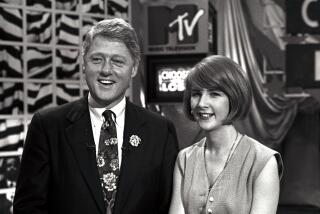TV Employees Create Network of Revolution
- Share via
PRAGUE, Czechoslovakia — If a playwright and a former Communist Party leader are the George Washington and Benjamin Franklin of the Czechoslovak revolution, then a collection of technicians, drivers and clerks who call themselves “the Garage Men” are its Paul Revere.
Taking their name from the location of their first meeting, a parking complex in the 4th District, these workers played a key role in the stunning about-face that saw state television change overnight from a sterile relic of thought control into a vital engine for reform.
Jan Urban, a strategist with the umbrella opposition group known as the Civic Forum, said that what caused the transformation was “an uprising of the staff,” with the Garage Men at the core.
The change is reflected in the banners carried by the hundreds of thousands of people who have been taking to the streets here daily. “Television Lies!” the banners said last Friday. “Long Live TV!” they said a day later.
Newscasts that for years were mostly mind-numbing paeans to the glories of socialism now have people stopping in front of shops to view often crude but relatively objective reports of a nation in peaceful political upheaval.
By Monday, state television had abandoned its traditional morning off and sent all of its remote broadcast trucks into the field. From there, they broadcast live from a dozen cities where workers took part in a symbolic nationwide strike in support of a multi-party system and free elections. The program included stinging commentary on four decades of Communist rule.
“We are doing things that would have been unthinkable” as recently as the end of last week, said a technician interviewed at TV headquarters on the city’s outskirts.
“It’s old people but new thinking,” anchor Josef Moravek put in. “People stopped being afraid, so they’re screening things they wouldn’t screen before.”
What had been one of Eastern Europe’s most conservative broadcasting operations is now independent, Moravek said.
Officially? he was asked.
“Is anything official these days?” he responded, laughing.
According to a source close to the Communist leadership, the key is that the general director of state television now reports in fact to the official to whom he has always reported in theory: the prime minister.
“In the past,” this source said, “it was run by the Central Committee (of the Communist Party).”
The transformation in programming became clear to Czechoslovak viewers only Saturday, when they witnessed a number of extraordinary firsts:
Live coverage of an anti-government demonstration.
A massive protest that drew a crowd officially estimated at 500,000 to 800,000.
Transmission of a complete Roman Catholic Mass.
A commemorative service at St. Vitus Cathedral for the recently canonized St. Anezka, a medieval Bohemian princess whose mediation prevented a war.
Broadcast of a speech by Alexander Dubcek, the former Communist Party chief. It was Dubcek who inspired the “Prague Spring” reforms of 1968 that were cut short by a Soviet-led Warsaw Pact invasion.
A televised political statement by the oft-jailed leader of the opposition movement, dissident playwright Vaclav Havel.
The behind-the-scenes drama that precipitated these changes goes back exactly a week, to last Tuesday, when the Garage Men had their first meeting.
The country was already astir following the brutal suppression by the police of a Nov. 17 student protest demonstration at Wenceslas Square. But no one would have known it from what was being broadcast on state television.
About 3,000 of television’s 5,000 or so employees gathered in the garage where the remote-broadcast trucks are normally parked to vent their frustration. According to Stefan Rybar, a television editor and member of the newly formed employees’ program council, someone rigged things so that the meeting was transmitted to remote state broadcasting facilities as well; by the time it was over, those present had selected a committee of seven to negotiate with television management.
They threatened to strike unless management agreed to live transmissions from Wenceslas Square, where growing crowds were gathering nightly, and to the screening of a videotape, made by an amateur, showing police officers brutally suppressing the Nov. 17 demonstration, Rybar said in an interview.
The struggle was carried on through much of last week. At one point, more than 100 police officers were called in to control the situation. “They didn’t do anything; they were just there,” Rybar said.
The authorities permitted slightly more comprehensive and objective coverage of events but stopped far short of what was wanted. The strike committee continued to negotiate.
On Thursday, a deputy prime minister took over the supervision of state television, and on Friday, the first of two emergency weekend meetings of the Communist Party Central Committee began ousting the most rigid hard-liners from the leadership.
The turning point, according to a party insider, came on the issue of live coverage of the planned opposition demonstration last Saturday at the Letna parade grounds. The key question, he recalled, was, “Letna, yes or no?” and the answer was, “Why not?”
The most important effect of state television’s new approach is that almost instantly it turned what had been mostly a Prague revolution into a Czechoslovak revolution. Regional cities, starved for information about what was going on, suddenly became aware and joined in.
“I think TV is very important in contemporary revolutions,” the party insider said with a smile.
Rybar said the goal of the employees’ program council is straightforward: “to take over the television.”
The council has already proved to be influential, but the battle for television is far from over. Prime Minister Ladislav Adamec’s office announced Monday that Libor Bateria, general director of television, had been dismissed and replaced by Adamec spokesman Miroslav Pavel. Government sources say the state radio director is also likely to be replaced soon.
Clearly, the more progressive government and party officials are trying to get on board the reform bandwagon to avoid being swept away in the popular tide that has overwhelmed the most reactionary former leaders.
These officials, according to an informed party source, were behind a one-hour telecast Monday night called “The Government Speaks With You.” It was the first in what is meant to be a weekly series, he said.
Referring to the workers’ council, he commented, “You can’t have such an important thing like television in so few hands.”
This, from a representative of a party that has long used television for its own narrow political purposes, was ironic.
More to Read
Sign up for Essential California
The most important California stories and recommendations in your inbox every morning.
You may occasionally receive promotional content from the Los Angeles Times.













